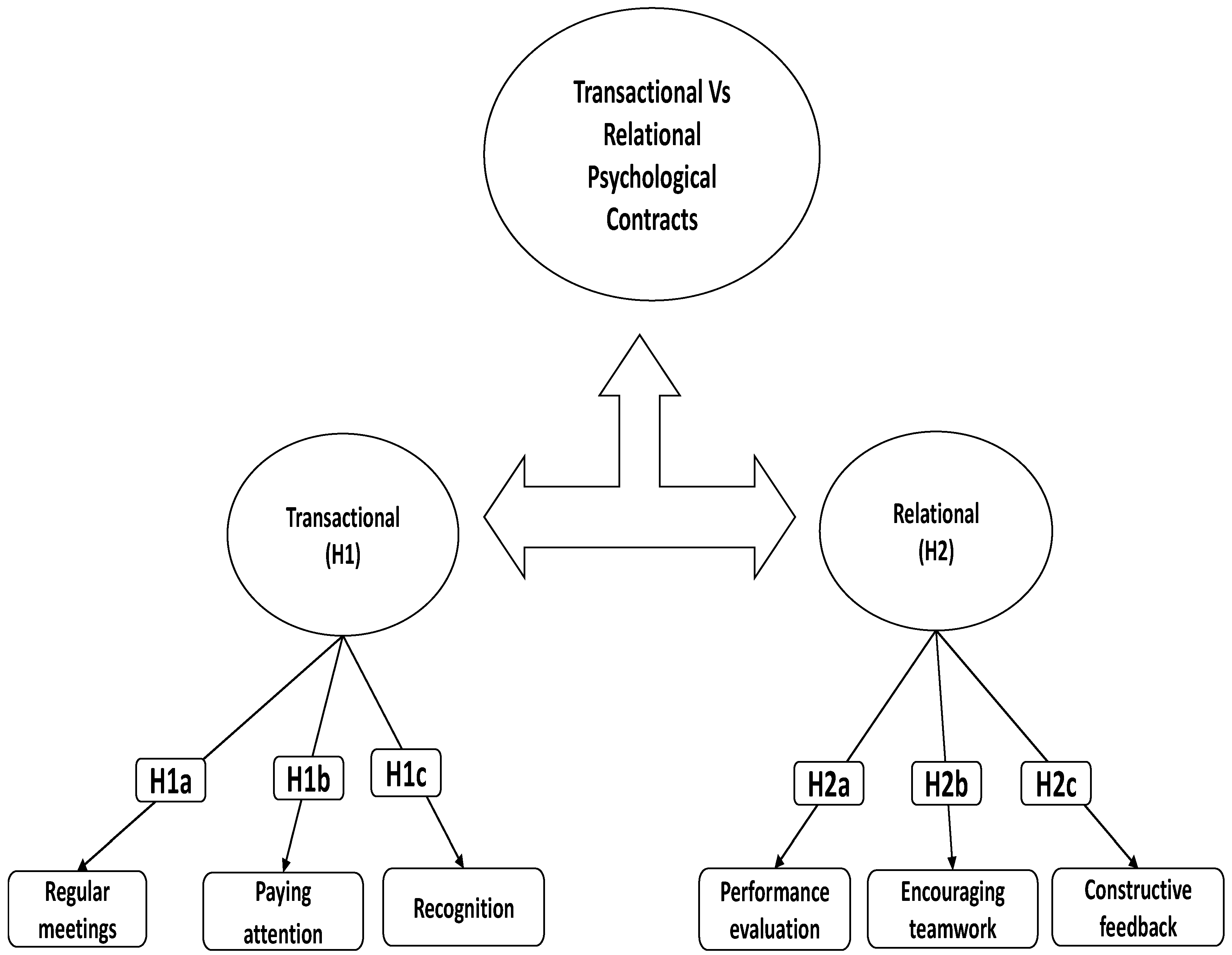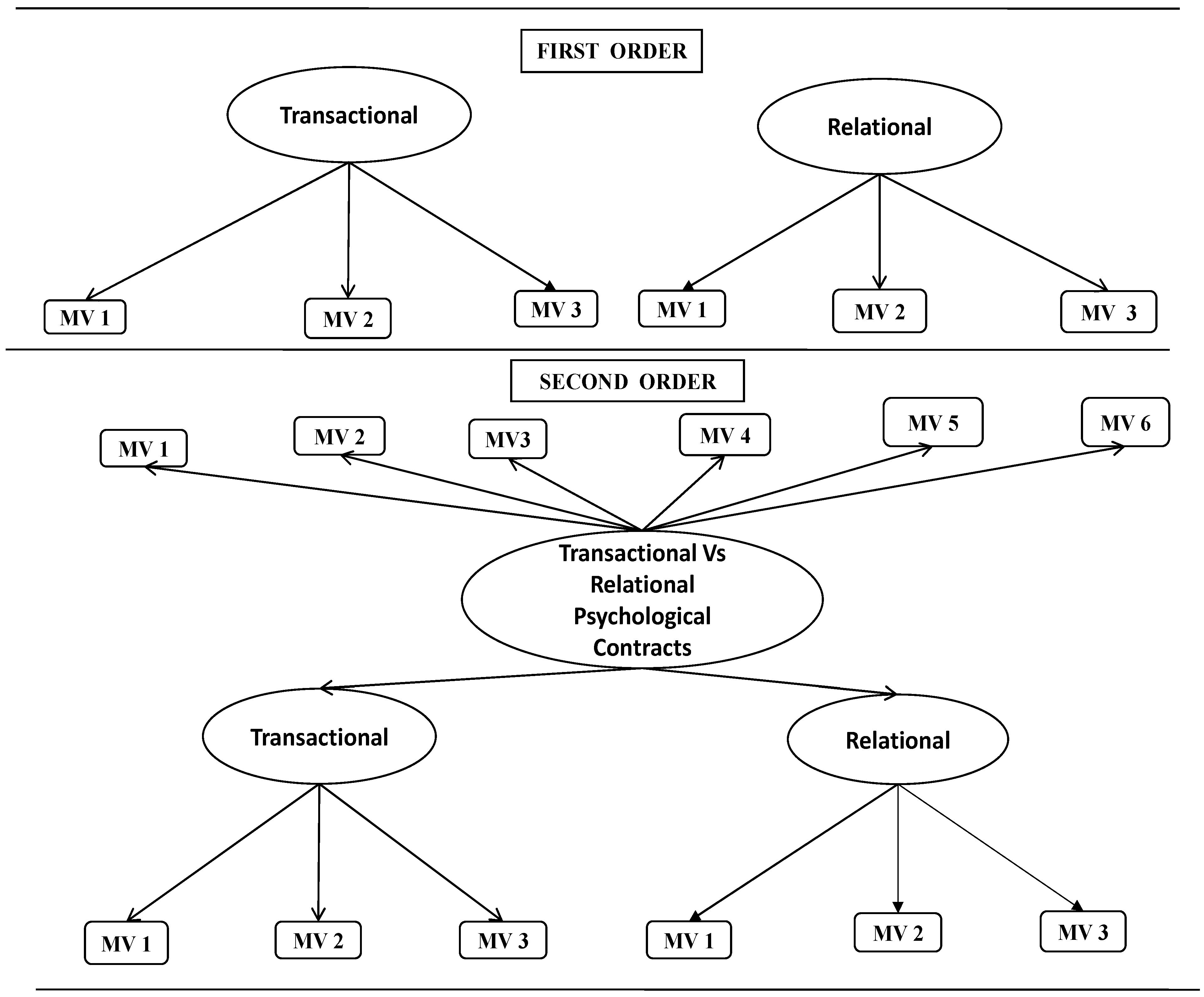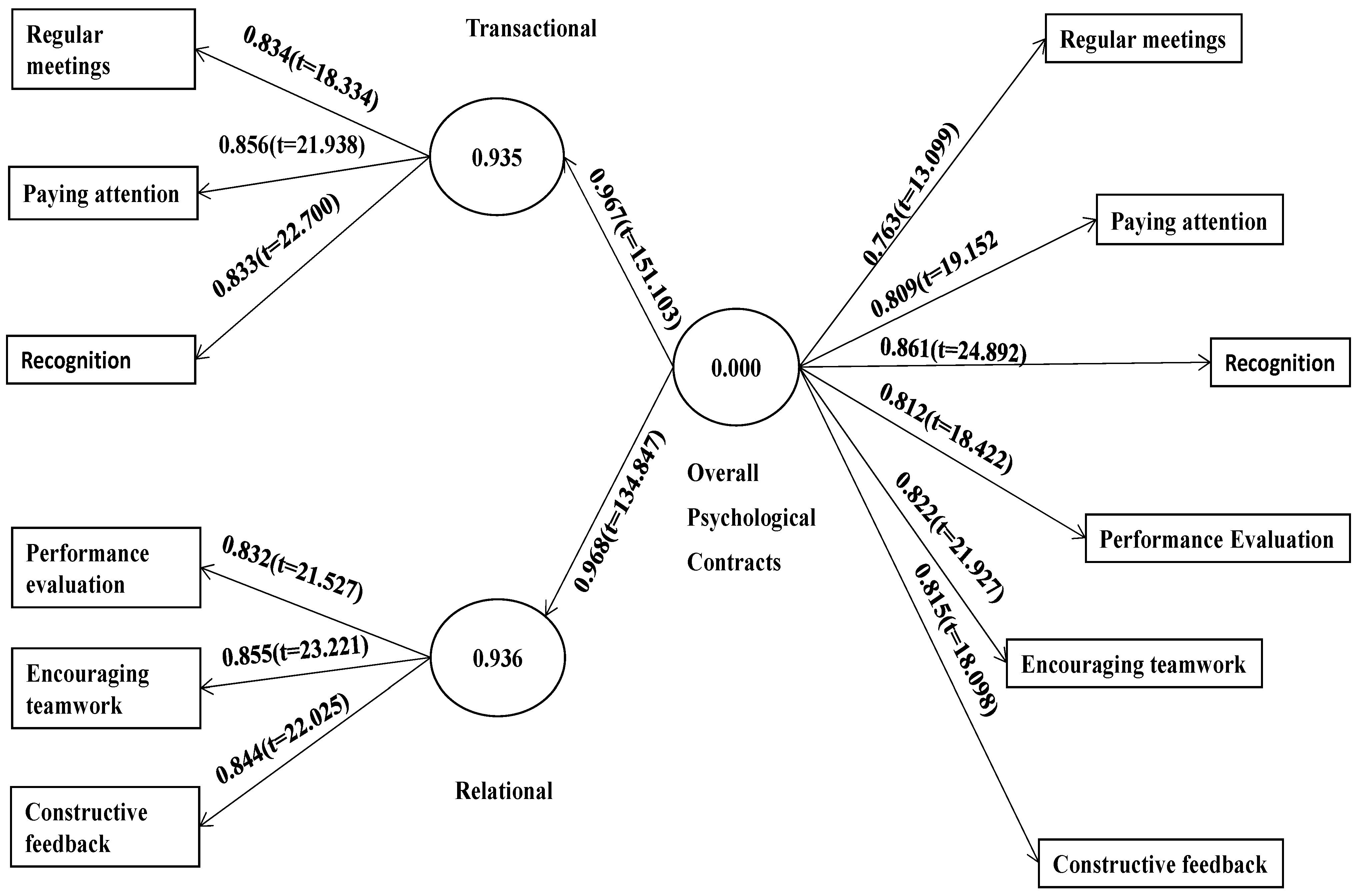Psychological Contract and Young Talent Retention in Vietnam: Development and Validation of a Hierarchical Reflective Structural Model
Abstract
:1. Introduction
2. Literature Review
2.1. Psychological Contract and Young Talent Retention
2.2. Conceptual Model and Hypothesis Development
3. Methodology
Questionnaire Survey
4. Findings
4.1. Analysis of Measurement Model
4.2. Assessment of Higher-Order Structural Model Hypotheses Testing
5. Discussion
6. Conclusions and Future Research
Study Limitations and Future Research
Author Contributions
Funding
Institutional Review Board Statement
Informed Consent Statement
Data Availability Statement
Conflicts of Interest
Correction Statement
References
- Nguyen, D.T.N.; Teo, S.T.T.; Ho, M. Development of human resource management in Vietnam: A semantic analysis. Asia Pac. J. Manag. 2018, 35, 241–284. [Google Scholar] [CrossRef]
- D’Amato, A.; Herzfeldt, R. Learning orientation, organizational commitment and talent retention across generations: A study of European managers. J. Manag. Psychol. 2008, 23, 929–953. [Google Scholar] [CrossRef]
- Cropanzano, R.; Anthony, E.L.; Daniels, S.R.; Hall, A.V. Social Exchange Theory: A Critical Review with Theoretical Remedies. Acad. Manag. Ann. 2016, 11, 479–516. [Google Scholar] [CrossRef]
- Agarwal, U.A.; Gupta, R.K. Examining the Nature and Effects of Psychological Contract: Case Study of an Indian Organization. Thunderbird Int. Bus. Rev. 2018, 60, 175–191. [Google Scholar] [CrossRef]
- Kutaula, S.; Gillani, A.; Budhwar, P.S. An analysis of employment relationships in Asia using psychological contract theory: A review and research agenda. Hum. Resour. Manag. Rev. 2020, 30, 100707. [Google Scholar] [CrossRef]
- Khuda, K.; Hack-Polay, D. The evolution of psychological contract research and the missing linking of the developing world. In Proceedings of the EURAM Conference 2018, Reykjavik, Iceland, 20–23 June 2018. [Google Scholar]
- Festing, M.; Schäfer, L. Generational challenges to talent management: A framework for talent retention based on the psychological-contract perspective. J. World Bus. 2014, 49, 262–271. [Google Scholar] [CrossRef]
- Aggarwal, U.; Bhargava, S. Predictors and Outcomes of Relational and Transactional Psychological Contract. Psychol. Stud. 2010, 55, 195–207. [Google Scholar] [CrossRef]
- Guest, D.E.; Conway, N. Communicating the psychological contract: An employer perspective. Hum. Resour. Manag. J. 2002, 12, 22–38. [Google Scholar] [CrossRef]
- Zagenczyk, T.J.; Cruz, K.S.; Cheung, J.H.; Scott, K.L.; Kiewitz, C.; Galloway, B. The moderating effect of power distance on employee responses to psychological contract breach. Eur. J. Work Organ. Psychol. 2015, 24, 853–865. [Google Scholar] [CrossRef]
- Clinton, M.E.; Guest, D.E. Psychological contract breach and voluntary turnover: Testing a multiple mediation model. J. Occup. Organ. Psychol. 2014, 87, 200–207. [Google Scholar] [CrossRef]
- Balabanova, E.; Ehrnrooth, M.; Koveshnikov, A.; Efendiev, A. Employee exit and constructive voice as behavioral responses to psychological contract breach in Finland and Russia: A within- and between-culture examination. Int. J. Hum. Resour. Manag. 2019, 33, 360–391. [Google Scholar] [CrossRef]
- Pate, J.; Scullion, H. The flexpatriate psychological contract: A literature review and future research agenda. Int. J. Hum. Resour. Manag. 2018, 29, 1402–1425. [Google Scholar] [CrossRef]
- Bal, P.M.; Kooij DT, A.M.; De Jong, S.B. How Do Developmental and Accommodative HRM Enhance Employee Engagement and Commitment? The Role of Psychological Contract and SOC Strategies. J. Manag. Stud. 2013, 50, 545–572. [Google Scholar] [CrossRef]
- Garavan, T.N.; Carbery, R.; Rock, A. Mapping talent development: Definition, scope and architecture. Eur. J. Train. Dev. 2012, 36, 5–24. [Google Scholar] [CrossRef]
- Iles, P.; Chuai, X.; Preece, D. Talent Management and HRM in Multinational companies in Beijing: Definitions, differences and drivers. J. World Bus. 2010, 45, 179–189. [Google Scholar] [CrossRef]
- Cook, S. Talent management: Key questions for learning and development. Dev. Learn. Organ. Int. J. 2010, 24, 37–41. [Google Scholar] [CrossRef]
- Christensen, R. Roadmap to Strategic HR: Turning a Great Idea into a Business Reality; Amacom Books: New York, NY, USA, 2006. [Google Scholar]
- Govaerts, N.; Baert, H. Learning patterns in organizations: Towards a typology of workplace-learning configurations. Hum. Resour. Dev. Int. 2011, 14, 545–559. [Google Scholar] [CrossRef]
- Wallis, T.; Winternitz, G.; Birt, M. Talent retention in a changing workplace: An investigation of variables considered important to South African talent. S. Afr. J. Bus. Manag. 2004, 35, 25–31. [Google Scholar]
- Govaerts, N.; Kyndt, E.; Dochy, F.; Baert, H. Influence of learning and working climate on the retention of talented employees. J. Workplace Learn. 2011, 23, 35–55. [Google Scholar] [CrossRef]
- Kundu, S.C.; Lata, K. Effects of supportive work environment on employee retention: Mediating role of organizational engagement. Int. J. Organ. Anal. 2017, 25, 703–722. [Google Scholar] [CrossRef]
- Fletcher, L.; Alfes, K.; Robinson, D. The relationship between perceived training and development and employee retention: The mediating role of work attitudes. Int. J. Hum. Resour. Manag. 2018, 29, 2701–2728. [Google Scholar] [CrossRef]
- Herman, R.E. HR managers as employee-retention specialists. Employ. Relat. Today 2005, 32, 1–7. [Google Scholar] [CrossRef]
- Hiltrop, J.-M. The quest for the best: Human resource practices to attract and retain talent. Eur. Manag. J. 1999, 17, 422–430. [Google Scholar] [CrossRef]
- Rodriguez, R. Learning’s impact on talent flow. Chief Learn. Off. 2008, 7, 50–64. [Google Scholar]
- Kyndt, E.; Dochy, F.; Michielsen, M.; Moeyaert, B. Employee retention: Organisational and personal perspectives. Vocat. Learn. 2009, 2, 195–215. [Google Scholar] [CrossRef]
- Hung, T.V. Developing strategic corporate social responsibility initiatives to enhance brand reputation in the case of Vietnam. In Proceedings of the International Conference on Business 2015: Corporate Social Responsibility and Sustainable Business Development, Ho Chi Minh City, Vietnam, 27 November 2015. [Google Scholar]
- Nguyen, M.; Truong, M. The Effect of Culture on Enterprise’s Perception of Corporate Social Responsibility: The Case of Vietnam. Procedia CIRP 2016, 40, 680–686. [Google Scholar] [CrossRef]
- Whelan, E.; Carcary, M. Integrating talent and knowledge management: Where are the benefits? J. Knowl. Manag. 2011, 15, 675–687. [Google Scholar] [CrossRef]
- Pruis, E. The five key principles for talent development. Ind. Commer. Train. 2011, 43, 206–216. [Google Scholar] [CrossRef]
- Bonneton, D.; Schworm, S.K.; Festing, M.; Muratbekova-Touron, M. Do global talent management programs help to retain talent? A career-related framework. Int. J. Hum. Resour. Manag. 2019, 33, 203–238. [Google Scholar] [CrossRef]
- Hofstede, G. Dimensionalizing cultures: The Hofstede model in context. Online Read. Psychol. Cult. 2011, 2, 2307–0919. [Google Scholar] [CrossRef]
- Mahmoud, A.B.; Fuxman, L.; Mohr, I.; Reisel, W.D.; Grigoriou, N. “We aren’t your reincarnation!” workplace motivation across X, Y and Z generations. Int. J. Manpow. 2021, 42, 193–209. [Google Scholar] [CrossRef]
- Twenge, J.M.; Campbell, S.M.; Hoffman, B.J.; Lance, C.E. Generational Differences in Work Values: Leisure and Extrinsic Values Increasing, Social and Intrinsic Values Decreasing. J. Manag. 2010, 36, 1117–1142. [Google Scholar] [CrossRef]
- Chillakuri, B. Understanding Generation Z expectations for effective onboarding. J. Organ. Change Manag. 2020, 33, 1277–1296. [Google Scholar] [CrossRef]
- Flippin, C.S. Millennials in the Workplace: Helping the Largest Generation Group Succeed at Work and in Their Careers. Candace Steele Flippin. 2017. Available online: https://books.google.co.uk/books?id=mH5StAEACAAJ (accessed on 14 January 2020).
- Culiberg, B.; Mihelič, K.K. Three ethical frames of reference: Insights into Millennials’ ethical judgements and intentions in the workplace. Bus. Ethics: A Eur. Rev. 2016, 25, 94–111. [Google Scholar] [CrossRef]
- Bannon, S.; Ford, K.; Meltzer, L. Understanding millennials in the workplace. CPA J. 2011, 81, 61. [Google Scholar]
- Zentner, E. Millennials Aren’t Spending All Their Money on Avocado Toast, Actually. The New York Times. Available online: https://www.nytimes.com/2020/01/31/opinion/sunday/student-loans-retirement-millennials.html (accessed on 17 October 2020).
- Lim, P.; Parker, A.; Lim, P.; Parker, A. The Millennial. In Mentoring Millennials in an Asian Context; Emerald Publishing Limited: Bingley, UK, 2020; pp. 9–13. [Google Scholar] [CrossRef]
- Au-Yong-Oliveira, M.; Gonçalves, R.; Martins, J.; Branco, F. The social impact of technology on millennials and consequences for higher education and leadership. Telemat. Inform. 2018, 35, 954–963. [Google Scholar] [CrossRef]
- Benfer, E.A.; Shanahan, C.F. Educating the invincibles: Strategies for teaching the millennial generation in law school. Clin. L. Rev. 2013, 20, 1. [Google Scholar]
- Thompson, C.; Gregory, J.B. Managing Millennials: A Framework for Improving Attraction, Motivation, and Retention. Psychol.-Manag. J. 2012, 15, 237–246. [Google Scholar] [CrossRef]
- Odenweller, K.G.; Booth-Butterfield, M.; Weber, K. Investigating Helicopter Parenting, Family Environments, and Relational Outcomes for Millennials. Commun. Stud. 2014, 65, 407–425. [Google Scholar] [CrossRef]
- Wheeler, S.A. Thriving millennials: The next generation of industry professionals. J. Equip. Lease Financ. 2017, 35, 1–6. [Google Scholar]
- Endress, T.W. The Perception of Millennial Professional Engineer Regarding Workplace Job Satisfaction: An Exploratory Study; Capella University: Minneapolis, MN, USA, 2019. [Google Scholar]
- Porschitz, E.; Hay, S. How to Attract, Manage and Retain MiIlenniaIs. Bus. NH Mag. 2016, 33, 30–31. [Google Scholar]
- Utah State Bar Innovation in Practice Committee. Give Up Trying to Manage Millennial—Work with Them Instead. Utah Bar J. 2018, 31, 37. [Google Scholar]
- Chatman, J.; Gino, F. Don’t Let the Pandemic Sink your Company Culture. Harvard Business Review. Available online: https://hbr.org/2020/08/dont-let-the-pandemic-sink-your-company-culture (accessed on 18 October 2020).
- McGuinness, S.; Kelly, E.; Phuong, P.T.T.; Thuy, H.T.T. Returns to Education and the Demand for Labour in Vietnam. ESRI Working Paper. Available online: https://www.econstor.eu/bitstream/10419/129428/1/83205013X.pdf (accessed on 18 October 2015).
- Worldometer. Vietnam Population. Available online: https://www.worldometers.info/world-population/vietnam-population/ (accessed on 18 October 2020).
- Nguyen Phuong, A.; Robinson Alan, G. Continuous improvement in Vietnam: Unique approaches for a unique culture. J. Asia Bus. Stud. 2015, 9, 195–211. [Google Scholar] [CrossRef]
- Thang, N.N.; Quang, T. The impact of training on firm performance in a transitional economy-evidence from Vietnam. Res. Pract. Hum. Resour. Manag. 2011, 19, 11–24. [Google Scholar]
- Abbott, P.; Bentzen, J.; Huong, T.L.; Tarp, F. A Critical Review of Studies on the Social and Economic Impacts of Vietnam’s International Economic Integration. 2007. Available online: https://EconPapers.repec.org/RePEc:pra:mprapa:29789 (accessed on 11 August 2020).
- Li, H.; Bui, V.Q.; Cao, Y. One country, two cultures: Implicit space–time mappings in Southern and Northern Vietnamese. Eur. J. Soc. Psychol. 2018, 48, 560–565. [Google Scholar] [CrossRef]
- Thang, N.N.; Quang, T. International briefing 18: Training and development in Vietnam. Int. J. Train. Dev. 2007, 11, 139–149. [Google Scholar] [CrossRef]
- Tran, K.D. Human Resource Management, 9th ed.; University of Economics: Ho Chi Minh City, Vietnam, 2015. [Google Scholar]
- Dung, T.K.; Anh, T.T.L. A framework of significant human resource management practices in Vietnam. J. Econ. Dev. 2019, 24, 46–63. [Google Scholar] [CrossRef]
- Jenkins, A.M. Research methodologies and MIS research. Res. Methods Inf. Syst. 1985, 103, 117. [Google Scholar]
- Malhotra, N. Marketing Research: An Applied Orientation, 7th ed.; Pearson Education, Inc.: Hoboken, NJ, USA, 2019. [Google Scholar]
- Podsakoff, P.M.; Organ, D.W. Self-Reports in Organizational Research: Problems and Prospects. J. Manag. 1986, 12, 531–544. [Google Scholar] [CrossRef]
- Mendy, J.; Rahman, M. Application of human resource management’s universal model: An examination of people versus institutions as barriers of internationalization for SMEs in a small developing country. Thunderbird Int. Bus. Rev. 2019, 61, 363–374. [Google Scholar] [CrossRef]
- Jarvis, C.B.; MacKenzie, S.B.; Podsakoff, P.M. A critical review of construct indicators and measurement model misspecification in marketing and consumer research. J. Consum. Res. 2003, 30, 199–218. [Google Scholar] [CrossRef]
- Wetzels, M.; Odekerken-Schröder, G.; van Oppen, C. Using PLS Path Modeling for Assessing Hierarchical Construct Models: Guidelines and Empirical Illustration. MIS Q. 2009, 33, 177–195. [Google Scholar] [CrossRef]
- Bollen, K.; Lennox, R. Conventional wisdom on measurement: A structural equation perspective. Psychol. Bull. 1991, 110, 305. [Google Scholar] [CrossRef]
- Bernhard-Oettel, C.; Canivet, C.; Aronsson, G.; StengÅRd, J.; ÖStergren, P.O. The role of social embeddedness for remaining in non-desired workplaces and mental health consequences: Results from Scania Public Health Cohort. Scand. J. Public Health 2018, 47, 334–343. [Google Scholar] [CrossRef]
- Özkan, M.; Solmaz, B. Generation Z-the global market’s new consumers-and their consumption habits: Generation Z consumption scale. Eur. J. Multidiscip. Stud. 2017, 2, 150–157. [Google Scholar] [CrossRef]
- Chin, P.-L.; Hung, M.-L. Psychological contract breach and turnover intention: The moderating roles of adversity quotient and gender. Soc. Behav. Personal. Int. J. 2013, 41, 843–859. [Google Scholar] [CrossRef]
- Aldossari, M.; Robertson, M. Repatriation and the psychological contract: A Saudi Arabian comparative study. Int. J. Hum. Resour. Manag. 2018, 29, 1485–1512. [Google Scholar] [CrossRef]
- Le Corre, J.Y.; Burger-Helmchen, T. Managerial Control in an Online Constructivist Learning Environment: A Teacher’s Perspective. Knowledge 2022, 2, 572–586. [Google Scholar] [CrossRef]
- Pham TT, K.; Vu, D.T.; Dinh, V.H. The Impact of Academic Aspect Quality on Student Disengagement in Higher Education. Educ. Sci. 2022, 12, 507. [Google Scholar] [CrossRef]



| Particulars | Categories | Percent |
|---|---|---|
| Age Group | 20 to 24 | 9.6 |
| 25 to 29 | 56.2 | |
| 30 to 35 | 34.2 | |
| Gender | Male | 28.8 |
| Female | 71.2 | |
| Position | Officer | 84.9 |
| Deputy Manager/Manager | 12.3 | |
| Working time | Less than 1 year | 23.3 |
| 1 to 3 years | 39.7 | |
| More than 3 years | 37.0 | |
| Education | Bachelor’s degree | 76.7 |
| Master’s degree or above | 23.3 |
| First Order |
| yi = ∆y.ηj + εi yi = manifest variables ∆y = loadings of first order latent variables ηj = first order latent variables εi = measurement error of manifest variables |
| Second Order |
| ηj = Г.ξk + ζj ηj = first order factors Г. = loadings of second order latent variables ξk = second order latent variables ζj = measurement error of first order factors |
| Constructs | Items Summary | Loadings | CR | CA | rho_A | AVE |
|---|---|---|---|---|---|---|
| Transactional | Regular meetings | 0.834 | 0.879 | 0.793 | 0.795 | 0.707 |
| Paying attention | 0.856 | |||||
| Recognition | 0.833 | |||||
| Relational | Performance evaluation | 0.832 | 0.881 | 0.798 | 0.798 | 0.712 |
| Encouraging teamwork | 0.855 | |||||
| Constructive feedback | 0.844 |
| Constructs | R Square | Adjusted R Square |
|---|---|---|
| Transactional | 0.935 | 0.934 |
| Relational | 0.936 | 0.935 |
| Original Sample Coefficient | Sample Mean Coefficient | Standard Deviation (STDEV) | p Values | T Statistics | |
|---|---|---|---|---|---|
| Overall Psychological Contracts -> Transactional | 0.967 | 0.967 | 0.007 | <0.0001 | 134.847 |
| Overall Psychological Contracts -> Relational | 0.968 | 0.968 | 0.006 | <0.0001 | 151.103 |
| Hypothesis | Path Coefficient | t-Value | Conclusion |
|---|---|---|---|
| H1a: Regular meetings as a factor of transactional psychological contracts and employment relations will not be independent from each other. | 0.834 | 18.334 | Supported |
| H1b: Paying attention as a factor of transactional psychological contracts and employment relations will not be independent from each other. | 0.856 | 21.938 | Supported |
| H1c: Recognition as a factor of transactional psychological contracts and employment relations will not be independent from each other | 0.833 | 22.700 | Supported |
| H2a: Performance evaluation as a factor of relational psychological contracts and employment relations will not be independent from each other. | 0.832 | 21.527 | Supported |
| H2b: Encouraging teamwork as a factor of relational psychological contracts and employment relations will not be independent from each other. | 0.855 | 23.221 | Supported |
| H2c: Constructive feedback as a factor of relational psychological contracts and employment relations will not be independent from each other. | 0.844 | 22.025 | Supported |
Disclaimer/Publisher’s Note: The statements, opinions and data contained in all publications are solely those of the individual author(s) and contributor(s) and not of MDPI and/or the editor(s). MDPI and/or the editor(s) disclaim responsibility for any injury to people or property resulting from any ideas, methods, instructions or products referred to in the content. |
© 2023 by the authors. Licensee MDPI, Basel, Switzerland. This article is an open access article distributed under the terms and conditions of the Creative Commons Attribution (CC BY) license (https://creativecommons.org/licenses/by/4.0/).
Share and Cite
Dam, N.; Hack-Polay, D.; Rahman, M.; Mahmoud, A.B. Psychological Contract and Young Talent Retention in Vietnam: Development and Validation of a Hierarchical Reflective Structural Model. Businesses 2023, 3, 36-51. https://doi.org/10.3390/businesses3010003
Dam N, Hack-Polay D, Rahman M, Mahmoud AB. Psychological Contract and Young Talent Retention in Vietnam: Development and Validation of a Hierarchical Reflective Structural Model. Businesses. 2023; 3(1):36-51. https://doi.org/10.3390/businesses3010003
Chicago/Turabian StyleDam, Ngan, Dieu Hack-Polay, Mahfuzur Rahman, and Ali B. Mahmoud. 2023. "Psychological Contract and Young Talent Retention in Vietnam: Development and Validation of a Hierarchical Reflective Structural Model" Businesses 3, no. 1: 36-51. https://doi.org/10.3390/businesses3010003
APA StyleDam, N., Hack-Polay, D., Rahman, M., & Mahmoud, A. B. (2023). Psychological Contract and Young Talent Retention in Vietnam: Development and Validation of a Hierarchical Reflective Structural Model. Businesses, 3(1), 36-51. https://doi.org/10.3390/businesses3010003








